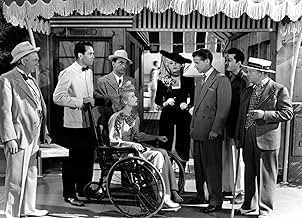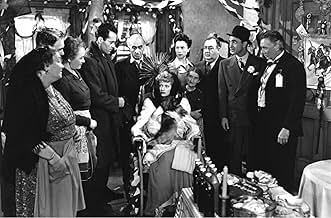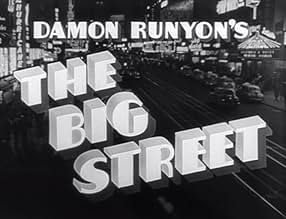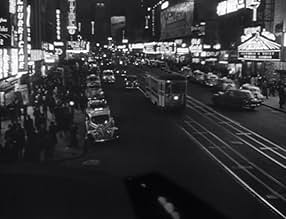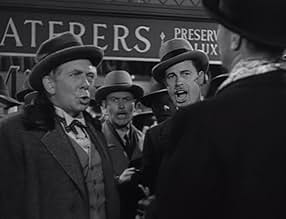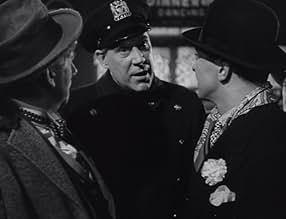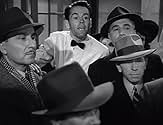NOTE IMDb
6,4/10
1,8 k
MA NOTE
Ajouter une intrigue dans votre langueA busboy in unrequited love with a nightclub performer grows closer to her after she is paralyzed in an attack by her gangster boyfriend.A busboy in unrequited love with a nightclub performer grows closer to her after she is paralyzed in an attack by her gangster boyfriend.A busboy in unrequited love with a nightclub performer grows closer to her after she is paralyzed in an attack by her gangster boyfriend.
- Réalisation
- Scénario
- Casting principal
- Récompenses
- 2 victoires au total
William T. Orr
- Decatur Reed
- (as William Orr)
Don Barclay
- Eating Contest Emcee
- (non crédité)
Mary Bayless
- Nightclub Patron
- (non crédité)
Louise Beavers
- Ruby - Gloria's Maid
- (non crédité)
Anthony Blair
- O'Rourke
- (non crédité)
Avis à la une
Damon Runyon's short story "Little Pinks" is turned by RKO into a solid acting showcase for Henry Fonda and Lucille Ball, also utilizing a troupe of colorful supporting players to their best advantage. Supper-club singer in New York City is crippled in a fall--and promptly loses her free ticket into high society. The only person who still cares for her is a smitten, well-meaning busboy; he hitchhikes all the way to Miami with the wheelchair-bound chanteuse, where they cross paths again with the well-heeled gangster who caused her unfortunate accident. The melodrama inherent in the main plot is suffused (and some may say strengthened) by the comedic overtures of the character turns, most especially by Eugene Palette and Agnes Moorehead as a couple who love to eat and argue. Ball, floundering at RKO in 1942, was quickly snapped up by MGM after this performance, and its clear why: her narcissistic songbird is self-centered and often ridiculously delusional, but your heart goes out to her anyhow. *** from ****
The Big Street (1942)
Packed with great actors, major and minor, in a fast fast whirlwind
First of all, Agnes Moorehead and Ray Collins played the previous year in another raging movie of some fame (Citizen Kane, yup), and here they are loaded up against a dozen other great character actors, plus a couple big names. Headlining is the well known Henry Fonda, still young, but fresh off of a couple great films, Grapes of Wrath (1940), and The Young Mr. Lincoln (1939). But in a kind of startling role for those who know Lucille Ball as a brilliant and goofy t.v. comedian a decade later, we have her here as a big-eyed femme fatale, or would-be femme fatale until fate takes a turn.
You might think this one is a screwball comedy the way it starts, but keep watching-- there is violence and trauma soon enough, and the movie takes a turn that Fonda is worthy of. There is a Frank Capra feel-good element amidst the hardship, but it is full of verve, and all these odd characters who really are (were and are) what New York is at its best. The director Irving Reis (with photographer Russell Metty) keeps the scenes snappy, and sometimes moves from a closeup of a face to a background quickly, to let a character make a dramatic point. There are lots of movie tricks, quick fades from scene to scene to show the passing of time, and some tacky back projection, and it really goes along with the fairy tale narrative.
And there really is an unbelievable ending, which you have to take with the whole flavor of the movie, a kind of sincerity/fantasy mixture.
Packed with great actors, major and minor, in a fast fast whirlwind
First of all, Agnes Moorehead and Ray Collins played the previous year in another raging movie of some fame (Citizen Kane, yup), and here they are loaded up against a dozen other great character actors, plus a couple big names. Headlining is the well known Henry Fonda, still young, but fresh off of a couple great films, Grapes of Wrath (1940), and The Young Mr. Lincoln (1939). But in a kind of startling role for those who know Lucille Ball as a brilliant and goofy t.v. comedian a decade later, we have her here as a big-eyed femme fatale, or would-be femme fatale until fate takes a turn.
You might think this one is a screwball comedy the way it starts, but keep watching-- there is violence and trauma soon enough, and the movie takes a turn that Fonda is worthy of. There is a Frank Capra feel-good element amidst the hardship, but it is full of verve, and all these odd characters who really are (were and are) what New York is at its best. The director Irving Reis (with photographer Russell Metty) keeps the scenes snappy, and sometimes moves from a closeup of a face to a background quickly, to let a character make a dramatic point. There are lots of movie tricks, quick fades from scene to scene to show the passing of time, and some tacky back projection, and it really goes along with the fairy tale narrative.
And there really is an unbelievable ending, which you have to take with the whole flavor of the movie, a kind of sincerity/fantasy mixture.
Anyone who has the slightest desire to learn more about the incredible talent of Lucille Ball and Henry Fonda owes it to themselves to see this marvelous movie. Over the years, these two stars built up such powerful images of themselves as star characters, and most of the public came to know them as a result of the cumulative impressions which they made on our individual consciousness. Your strong impression of Lucille Ball is as a comedian, correct? You seldom if ever think of her as a dramatic actress. Can you imagine Lucille Ball playing a role of a vain self-centered and arrogant harridan who seems to live for the sole purpose of tormenting the lowly busboy who is her one true friend in all the world? Few people can imagine Lucy in such a role, but if you watch this movie, you will see it happen. It is also totally believable because, even though Lucy worked primarily as a comedian, she was a great dramatic actress when she chose to accept a role of that type. As for Henry Fonda, who could even conceive of casting this great actor as a busboy? It was early in his career and he is playing a role of the type that he would never have to play again, but he pulls it off. You wonder at times why he is taking so much abuse from this woman. But the answer is incredibly simple. He deeply loves the woman, and his love comes shining through. If you want to see two great stars at work in the early days of their careers, check out this movie.
Broadway busboy Henry Fonda (as Agustus "Little Pinks" Pinkerton) idolizes self-centered lounge singer Lucille Ball (as Gloria "Your Highness" Lyons). When Ms. Ball falls on hard times, Mr. Fonda gets to lend a helping hand. The pair move to Florida, but tragedy follows
Although "Guys and Dolls" (1955) remains most representative, "The Big Street" captures the spirit of writer Damon Runyon's characters better than most Hollywood efforts, probably because Mr. Runyon produced.
They weren't the author's first choice for the leads, but Fonda's innocent charmer and Ball's selfish tragedienne are exemplary characterizations. Ball is especially noteworthy, as she did not receive many opportunities to play against type, and places herself squarely on par with the more successful "Golden Age:" actresses of the 1930s and 1940s; she is startling. Director Irving Reis coordinates his fine cast and crew very well, making camera angles and movement seem uncommonly fresh.
******** The Big Street (8/13/42) Damon Runyon : Irving Reis ~ Lucille Ball, Henry Fonda, Agnes Moorehead, Eugene Palette
They weren't the author's first choice for the leads, but Fonda's innocent charmer and Ball's selfish tragedienne are exemplary characterizations. Ball is especially noteworthy, as she did not receive many opportunities to play against type, and places herself squarely on par with the more successful "Golden Age:" actresses of the 1930s and 1940s; she is startling. Director Irving Reis coordinates his fine cast and crew very well, making camera angles and movement seem uncommonly fresh.
******** The Big Street (8/13/42) Damon Runyon : Irving Reis ~ Lucille Ball, Henry Fonda, Agnes Moorehead, Eugene Palette
The comments about the Fonda character having 'no reason' to take the abusive and selfishness of the Ball character makes me wonder if this person ever loved anyone unconditionally. There are many people in this world that take worse than the verbal abuse from the person they love and stay with them their whole lives.
The Ball character was very well done and I don't think I remember Ball being a character like that after this movie. I don't like Lucille Ball as a comedienne, its too bad that she wasn't able to continue as a dramatic actress she would have done well.
But the movie is all about love conquering the selfish...wish it was that way all the time.
The Ball character was very well done and I don't think I remember Ball being a character like that after this movie. I don't like Lucille Ball as a comedienne, its too bad that she wasn't able to continue as a dramatic actress she would have done well.
But the movie is all about love conquering the selfish...wish it was that way all the time.
Le saviez-vous
- AnecdotesLucille Ball's favorite of her films. She felt her performance was unjustly ignored by the Academy of Motion Picture Arts and Sciences (AMPAS).
- GaffesA gathering to raise money to send Gloria Lyons to Florida doesn't raise enough, so a suggestion is made to put it on a horse. A face-on shot of Horsethief shows him sitting down and pulling a paper from his inside pocket. He stands up and unfolds the paper, but then a long shot shows him just starting to take the paper from his pocket.
- Citations
Gloria Lyons: Love is something that gets you one room, two chins and 3 kids.
- Crédits fousOpening credits: "Loser's Lane --- the sidewalk in front of Mindy's Restaurant on Broadway-- is not as high-toned a trading center as Wall Street, but the brokers are a lot more colorful. Generally they prefer to put their money on a prizefight or horserace, but when the action slows, anything can happen and it usually does. Tonight, for example, the citizens of the Lane are discussing the latest contest in their usual quiet way --"
- ConnexionsFeatured in AFI Life Achievement Award: A Tribute to Henry Fonda (1978)
- Bandes originalesWho Knows?
(1942)
Lyrics by Mort Greene
Music by Harry Revel
Performed by Lucille Ball at the New York nightclub (uncredited)
Reprised by her with Ozzie Nelson and Orchestra at the Florida nightclub (Vocals for Miss Ball by Martha Mears) (uncredited)
Played often in the score
Meilleurs choix
Connectez-vous pour évaluer et suivre la liste de favoris afin de recevoir des recommandations personnalisées
- How long is The Big Street?Alimenté par Alexa
Détails
- Date de sortie
- Pays d’origine
- Langue
- Aussi connu sous le nom de
- The Big Street
- Lieux de tournage
- Miami, Floride, États-Unis(second unit - exteriors)
- Société de production
- Voir plus de crédits d'entreprise sur IMDbPro
- Durée1 heure 28 minutes
- Couleur
- Rapport de forme
- 1.37 : 1
Contribuer à cette page
Suggérer une modification ou ajouter du contenu manquant


